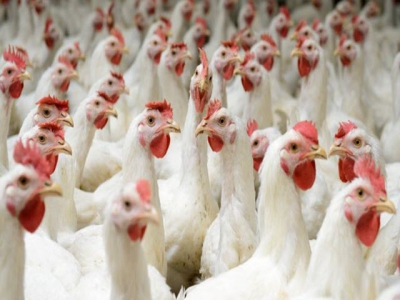Vitamin compound may encourage growth in chickens

Researchers at Kansas State University use vitamin substitute to encourage muscle growth in chickens.
A form of a vitamin associated with healthy aging in people has been used by Kansas State University researchers to build muscle in chickens -- a sign that could help the poultry industry meet future demand for its product.
Muscle biologist and meat scientist John Gonzalez and graduate student Stephanie Kruger said the university is pursuing a patent on a process in which scientists injected nicotinamide riboside — a compound similar to vitamin B3 — into unhatched chicken eggs to enhance muscle development of the offspring.
“We found that their organs and their overall growth were not affected, but we did see an increase in muscle mass,” Kruger said.
The findings may have significant implications for an industry that has seen global demand for chicken increase annually. Instead of trying to find ways to raise more birds, producers may one day be able to raise the same amount of birds more efficiently, the announcement said.
“We measured increases in the weight of the pectoralis maj or muscle, or the chicken breast,” Gonzalez said. “So, we hope that will translate down the line into larger muscles on those birds when they go to market.”
Nicotinamide riboside has been found to be a reliable substitute for vitamin B3 in human health studies, the researchers said. The compound is thought to help delay the effects of aging by boosting biological functions that affect stress responses, metabolism and other cellular activities.
Kruger said Kansas State’s work focused on injecting the compound into the unhatched eggs during the 10th day of incubation. She noted that the researchers discovered the best success when injecting nicotinamide riboside into the yolk of the egg.
“The thing that is interesting to us is that the response is fairly consistent,” Gonzalez said, noting that muscle mass increased by as much as 35% in the birds included in this study. “We’ve had different-sized eggs, we’ve had lots of eggs and we’ve run it four times, and we’ve had the same response each time.”
The Kansas State University Research Foundation is pursuing a patent for the researchers' work, which will help make the process available to the industry more quickly, the university said.
Related news
 Silicon supplement could improve chicken bone strength
Silicon supplement could improve chicken bone strength Supplement could benefit millions of individual birds every year as well as other species where bone strength is a concern.
 Sound waves may help diagnose wooden breasts in chicken
Sound waves may help diagnose wooden breasts in chicken Collaborative veterinary/poultry science research leads to exploring sound in data interpretation.
 Evonik takes stake in smarter chicken farming start-up
Evonik takes stake in smarter chicken farming start-up Evonik, through its venture capital unit, has invested in a UK precision livestock start-up aimed at improving poultry production.